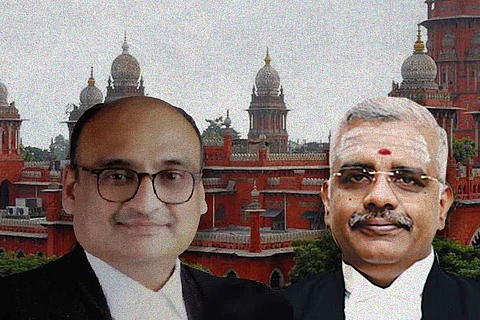

The Madras High Court, in a recent order, has directed the Tamil Nadu police to come up with a Standard Operating Procedure (SOP) to conduct potency tests by collecting a person’s blood samples alone. A ‘potency test’ is a medical test usually carried out by collecting the sperm of an accused in sexual violence cases, with the results supposed to establish whether a person is capable of engaging in sexual acts or not, and whether they could have committed the offence they have been charged with.
While delivering the directive on July 7, the bench of justices N Anand Venkatesh and Sunder Mohan also instructed the police to ensure that the ‘two-finger test’ have been discontinued. The court also asked the Director General of Police to submit data of medical reports of all cases involving sexual offences starting from January 1, 2023, and find out if the ‘two-finger’ test was conducted in any instance.
The ‘two-finger test’ or ‘virginity test’ is also an unscientific and regressive procedure, which involves the insertion of two fingers into a person’s vagina to gauge the laxity of vaginal muscles, thereby determining her ‘virginity’. This was deemed unconstitutional by the Supreme Court in 2013, and the Madras High Court, on multiple instances, has reiterated that the test should not be performed.
Asserting in its recent judgement as well that it wanted to ensure the “Two-Finger Test and the Archaic Potency Tests are discontinued”, the Madras HC added that the potency tests that “carries a mechanism of collecting sperm from the offender” was a method of the past. “Science has improved metes and bounds and it is possible to conduct this test by just collecting the blood sample. Such advanced techniques are being followed across the world and we should also fall in line,” the court said, and directed the police to come up with an SOP for the same. It also said that further action will be taken if any instance of ‘two-finger’ test is identified in the police data.
The court was hearing a habeas corpus petition filed in 2022 in Cuddalore by a father, who alleged that his daughter was illegally detained by the Child Welfare Committee (CWC). The CWC had forcibly taken away from her home after it received a purported video of the girl’s marriage with a boy of her own age. The court, however, observed that this was a case of consensual relationship between minors. It said the case has come to an end, adding that a closure report has also been filed before the Juvenile Justice Board finding that no offence was committed.
During the course of the hearing, another similar case in Dharmapuri was brought to the attention of the bench. In that case, a girl was taken away by a Block Development Officer (BDO) and lodged in a private home for more than a month, and was not allowed to go with her parents despite her being pregnant. The boy, who she was supposedly in a relationship with, was detained for nearly 20 days.
The court, however, pointed out that while both of them were a “child” in the eye of law, the girl was treated as a victim and the boy as a child in conflict with law. “This case must be taken to be a wakeup call to ensure that such incidents at least do not happen in the future. It is sad that none of the stakeholders were sensitive to the fact that both the boy and the girl were under 18 years and both of them are categorised as child under the relevant enactment,” the bench observed. It quashed the case after finding that the minor girl, in her police statement, said that she forced the boy to elope with her. Further, the parents had also not filed a complaint in the case.
The court also observed that there are as many as 1,728 such cases registered in Tamil Nadu between 2010 and 2013, out of which 1,274 are pending. Twenty-one cases are pending in Puducherry, six in Karaikal, and two in Yanam. “Having gathered this data, the next step is to ascertain the cases falling under the category of consensual relationship. If those cases are segregated from the pending cases, it will be easy for this court to deal with them,” the bench said. It added that in appropriate cases, the court can also exercise its jurisdiction and quash the proceedings if they are ultimately going to be against the interest and future of the children involved, and is found to be an abuse of the process of court or law.
The special bench of justices Anand and Sunder was constituted by the HC on June 20, 2023, to monitor the implementation of the Protection of Children from Sexual Offences (POCSO) Act and the Juvenile Justice Care and Protection Act (JJ Act). It was constituted as per an administrative order issued by the then acting Chief Justice T Raja in April 2023, based on a recommendation made by a bench of retired Justice PN Prakash and Justice Anand Venkatesh.